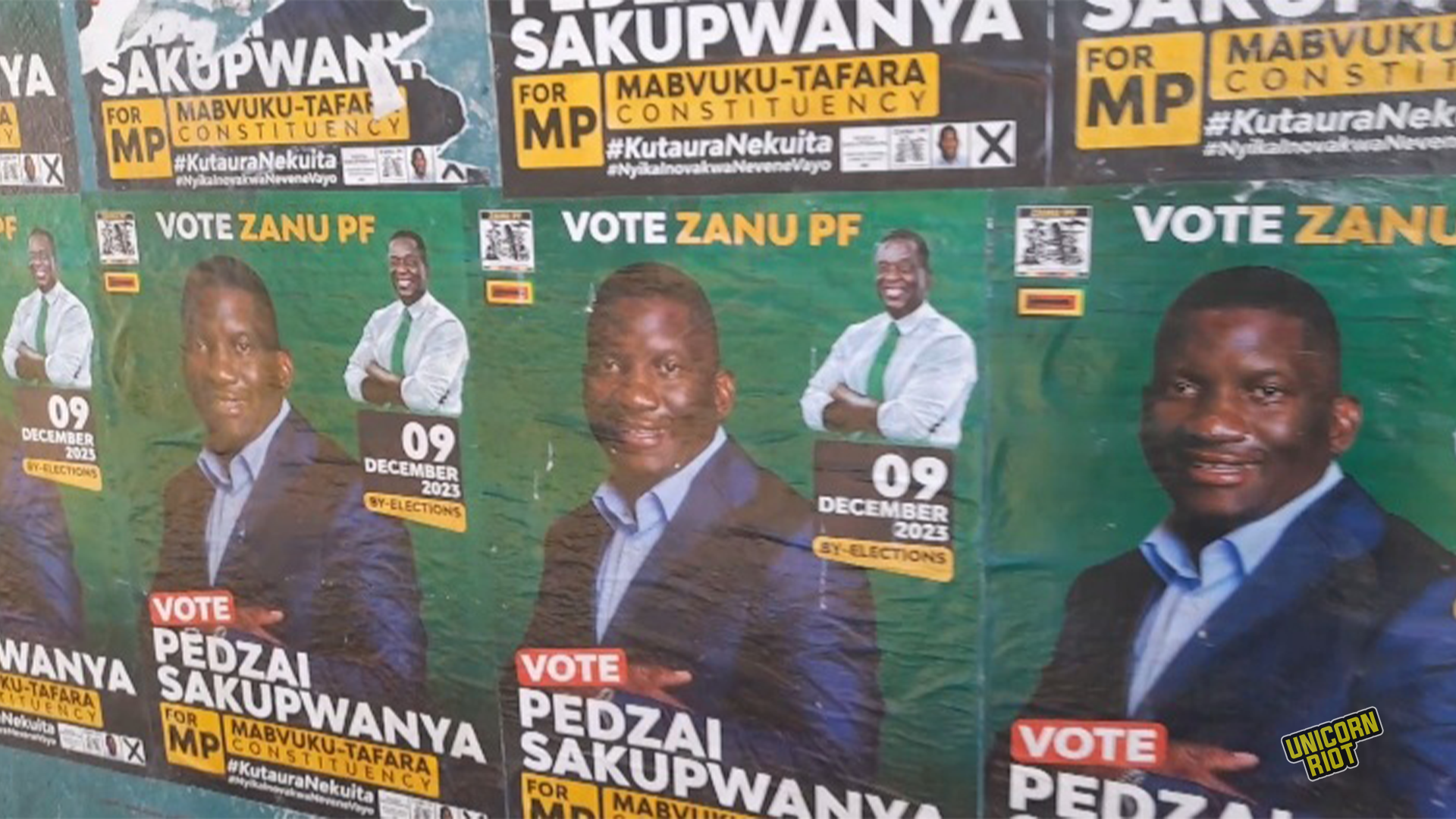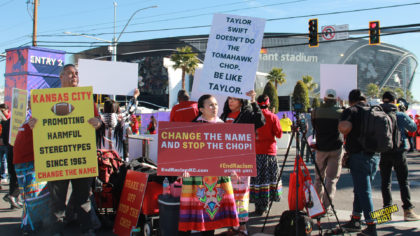‘Gold Mafia’ Kingpin Anointed MP as Zimbabwe Disenfranchises 108 Elected Officials
This article is an analysis of political fallout following the results of the heavily contested 2023 Zimbabwean general elections – find our past two reports here 1, 2. The views and opinions expressed don’t necessarily represent those of Unicorn Riot.
When Zimbabwean gold dealer Pedzai “Scott” Sakupwanya decided to chalk up some political adventures on a ruling-party ticket in the capital city, Harare, last year, he might have easily passed for a chancer. A hegemon in the more populous countryside, the ruling Zimbabwe African National Union – Patriotic Front (ZANU-PF) is out of its depth in bigger cities, and its fighting chance in Harare’s older townships and half-developed outskirts has been merely enough to deny the opposition a clean sweep.
But a new ZANU-PF socialite chases urban voters with prestige projects and overnight promises every election cycle. Sakupwanya was named Zimbabwe’s “number one” gold dealer in Al Jazeera’s 2023 investigative series on gold-smuggling and money-laundering. Held in fealty by the Gold Mafia’s international playboys and state actors, “the new Mr. Gold” could afford to outspend previous vote buyers without stopping to check his bank balance.
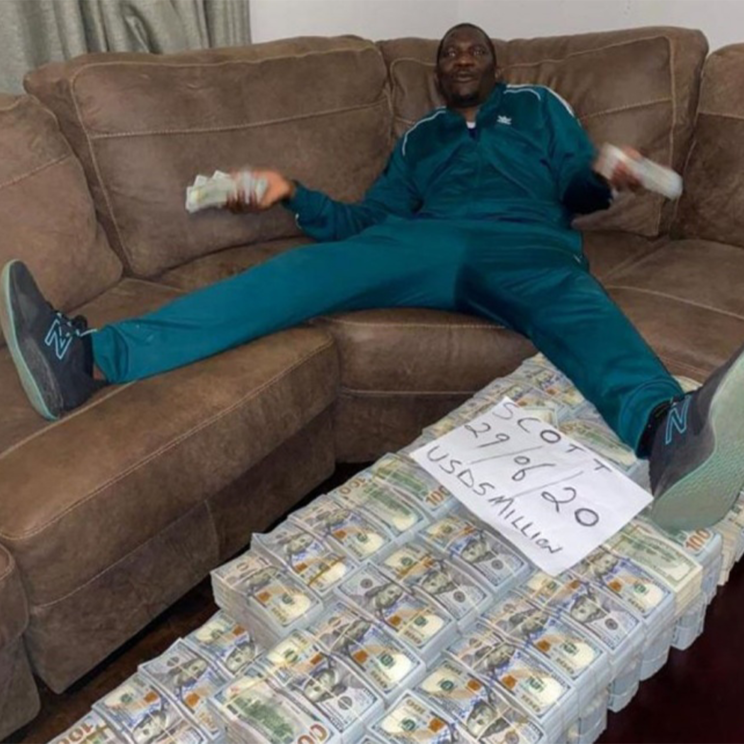
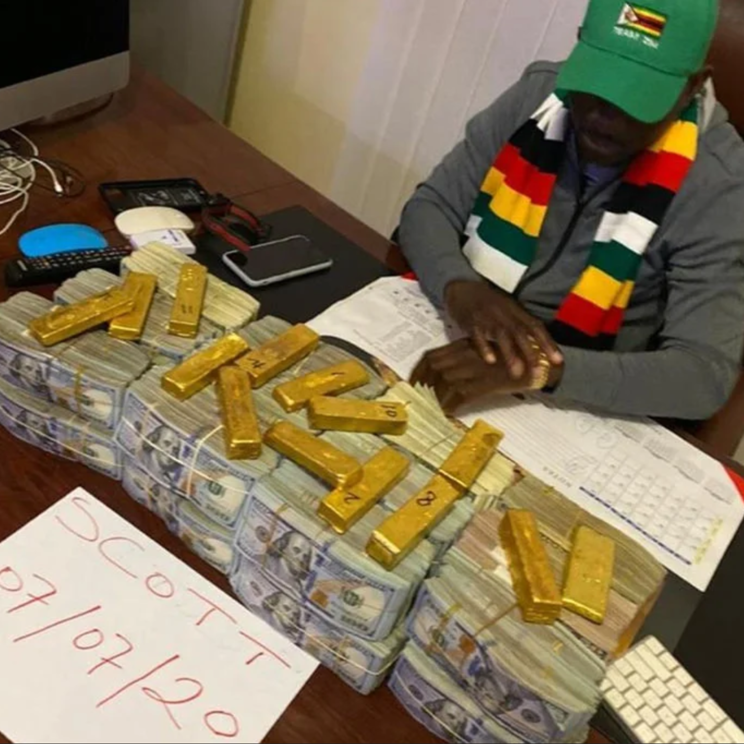
Sakupwanya chairs the Gold Buyers Association of Zimbabwe and is described by a mining watchdog as a “a grand gold buyer who uses his proximity to high political offices and loyalty to President Mnangagwa to maneuver his gold dealings.” According to the Centre for Natural Resource Governance (CNRG) report, artisanal mining helps corrupt players sideline official checks, while access to mining shafts is granted on the basis of ZANU-PF membership.
An eminent sponsor of the ruling party, Sakupwanya controls thousands of artisanal mining shafts. He is “receiving millions of dollars from rich people and the Reserve Bank of Zimbabwe to buy gold for them” and, per CNRG, is also involved in diamond trade.
In the August 2023 general elections, Sakupwanya ran for the Mabvuku-Tafara parliamentary seat elections against Citizen Coalition for Change (CCC)’s Munyaradzi Kufahakutizwi. “Mr. Gold” campaigned large as he sank boreholes, brought refuse collection trucks, arranged free buses for residents and flew in American boxing great Floyd Mayweather for an appearance fee of $250,000.

In contrast to Sakupwanya’s make-it-rain persona, opposition candidate Kufahakutizwi was nicknamed “Mebo” after a popular Zimbabwean song about a village pauper who chats up an uptown beauty. His supporters claimed for him organic ties to the neighborhood with the song’s deadpan refrain, “I love you as you are.” Only, his dream constituency was nothing like uptown beauty. Outlying Harare, between industrial areas and richer suburbs, Mabvuku and Tafara were originally built as dormitory townships for mostly male African workers in the colonial era.
After independence, older African townships exchanged their labor outlook for a family outlook but city planners fell out of pace with a growing population. Sizeable parts of Mabvuku and Tafara have not seen tap water for the better part of the last three decades while poor drainage exposes houses to seasonal floods.
The 2023 election was fought around basic drinking water. A former councilor, Kufahakutizwi had previously facilitated a couple of solar-powered boreholes for residents. His parliamentary campaign pitch was bringing potable water from the local “Kunzvi Dam” into homes.
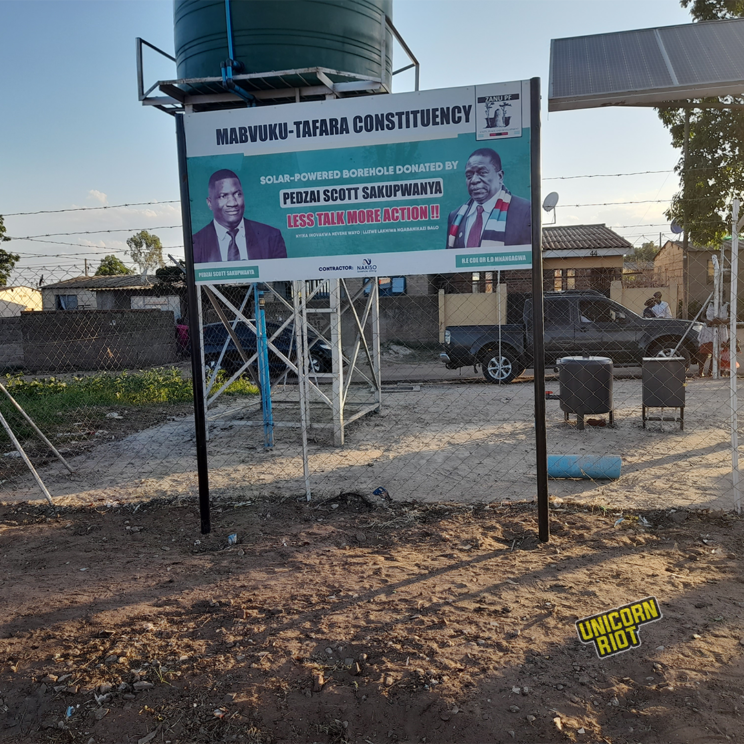
By Hook or Crook
Zimbabwe holds general elections that incorporate presidential, parliamentary and council seats, every five years. The southern African country’s parliament is made up of 280 seats, 60 of which are reserved for women and 10 for youths through proportional representation. By-elections are held before the end of the five-year term in case of the death, resignation or recalling of an elected official by their party.
Starting off as the Movement for Democratic Change (MDC) in 1999, the main opposition has split every general election cycle. The Zimbabwean constitution’s recall allows political parties to withdraw their members from parliament.
In the past two general elections, 45-year old opposition leader Nelson Chamisa has inspired the biggest challenge to Robert Mugabe’s successor, President Emmerson Mnangagwa, and the ruling ZANU-PF. In the aftermath of both elections, court rulings have, however, awarded control of Chamisa’s party to opposition rivals who were not part of his campaign. In both cases, a wave of recalls and by-elections have driven Chamisa out of his party and left Mnangagwa’s ZANU-PF to face a “proxy opposition” in Parliament.
In the August 2023 general elections, Kufahakutizwi won the Mabvuku-Tafara parliamentary seat with 15,680 votes to Sakupwanya’s 12,038. His party, the opposition CCC, outpolled ZANU-PF with 26 seats to four in Harare and registered a 12-seat clean sweep in the second capital city, Bulawayo. But the metropolitan returns were not enough to upset ZANU-PF’s 43-year rule as the late Robert Mugabe’s party won the parliamentary vote with 136 seats to CCC’s 73.
Combined with 33 proportionately acquired women’s quota seats and seven youth quota seats, Zanu-PF was only 10 seats shy of a two thirds (186/280 seats) majority. Determined to secure the supermajority required to amend the constitution, the party in government helped plunge Zimbabwe into eternal election mode and assured Sakupwanya a second crack at political office.
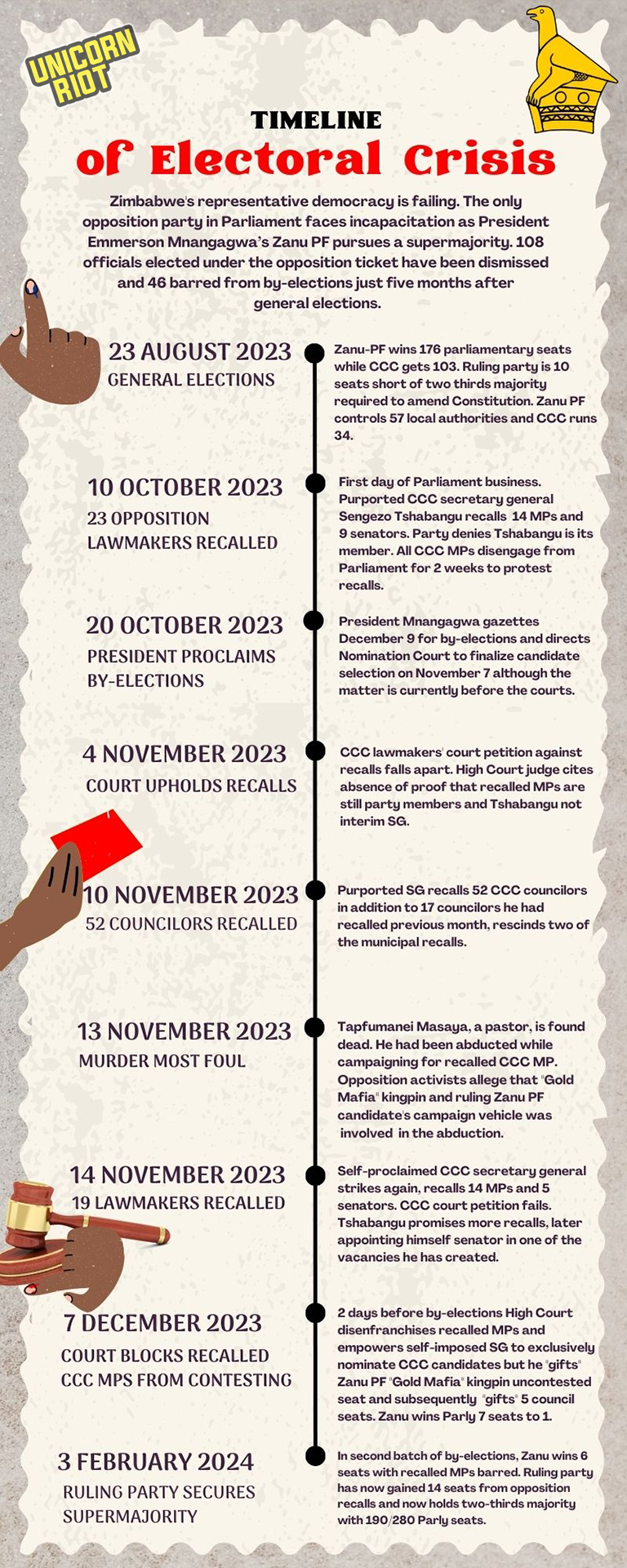
Zimbabwean Government Mounts Post-Election Propaganda Campaign – Oct. 2023
Zimbabwean Opposition ‘Disengages’ From Parliament in Protest of ‘Illegal Recalls’ – Oct. 2023
On December 7, 2023, Sakupwanya replaced Kufahakutizwi as MP for Mabvuku-Tafara. Despite losing by more than 3,000 votes four months earlier, Mr. Gold walked to parliament without standing in a subsequent election. Kufahakutizwi had been recalled from the house in controversial circumstances (see Unicorn Riot’s detailed report on the recalls) on October 10, along with 13 other opposition MPs and nine senators. President Mnangagwa promptly scheduled December 9 for by-elections.
Just two days before the by-elections, the High Court barred CCC candidates from contesting, notwithstanding the acceptance of their nomination papers by the electoral commission a month earlier. In the absence of another registered contestant for the Mabvuku-Tafara by-elections, Pedzai “Scott” Sakupwanya inherited the Mabvuku-Tafara seat for free.
CCC spokesperson Promise Mkwananzi said his party did not recognize the conduct and outcome of the by-elections. “We are going to see quite a lot of activities in constituencies that were denied the opportunity to vote for candidates of their choice, with the voters demanding their MPs back, demanding that if there is a by-election, people have a right to be voted for, as well as the right to vote for candidates of their choice.”
Going by its success in previous by-elections, CCC had been expected to regain lost seats. But plot twists blurring the separation of powers found the two-year old party unprepared and existentially threatened. The solely elected opposition withdrew its members from parliament for two weeks in protest of the initial recalls and vowed to boycott the by-elections but still went on to field recalled MPs, who would be disqualified at the last minute.
“You pour out $5 million dollars into an election and you deny people to choose, you deny candidates the right to participate. So it’s basically money that has been thrown away, whereas this money would have been redirected to the pressing needs of the nation. We [have] cholera; we have a dysfunctional health system,” the CCC spokesperson questioned President Mnangagwa’s priorities.
A third by-election – the first was held in a deceased candidate’s constituency and won by ZANU-PF – cost the taxpayers an estimated $6 million. Six CCC candidates from a second round of recalls were also barred from participating.
At the close of December 9 voting, ZANU-PF was only two seats short of its two-thirds majority objective. While the ruling party denied the existence of such an objective, CCC believes that the ruling party needed a decisive majority to amend the constitution and extend President Mnangagwa’s term limit. Meatime, Kufahakutizwi accused his usurper, Sakupwanya, of seeking political office by underhand means as a front to smuggle gold.
“Scott Sakupwanya wanted this seat so that he can be a deputy minister of mines,” Kufahakutizwi told Unicorn Riot: “What they want is to smuggle gold. Instead of taking it to Fidelity (the Central Bank arm for handling the metal), they want to go and sell it to Dubai. It is their plan as gold mafia.”
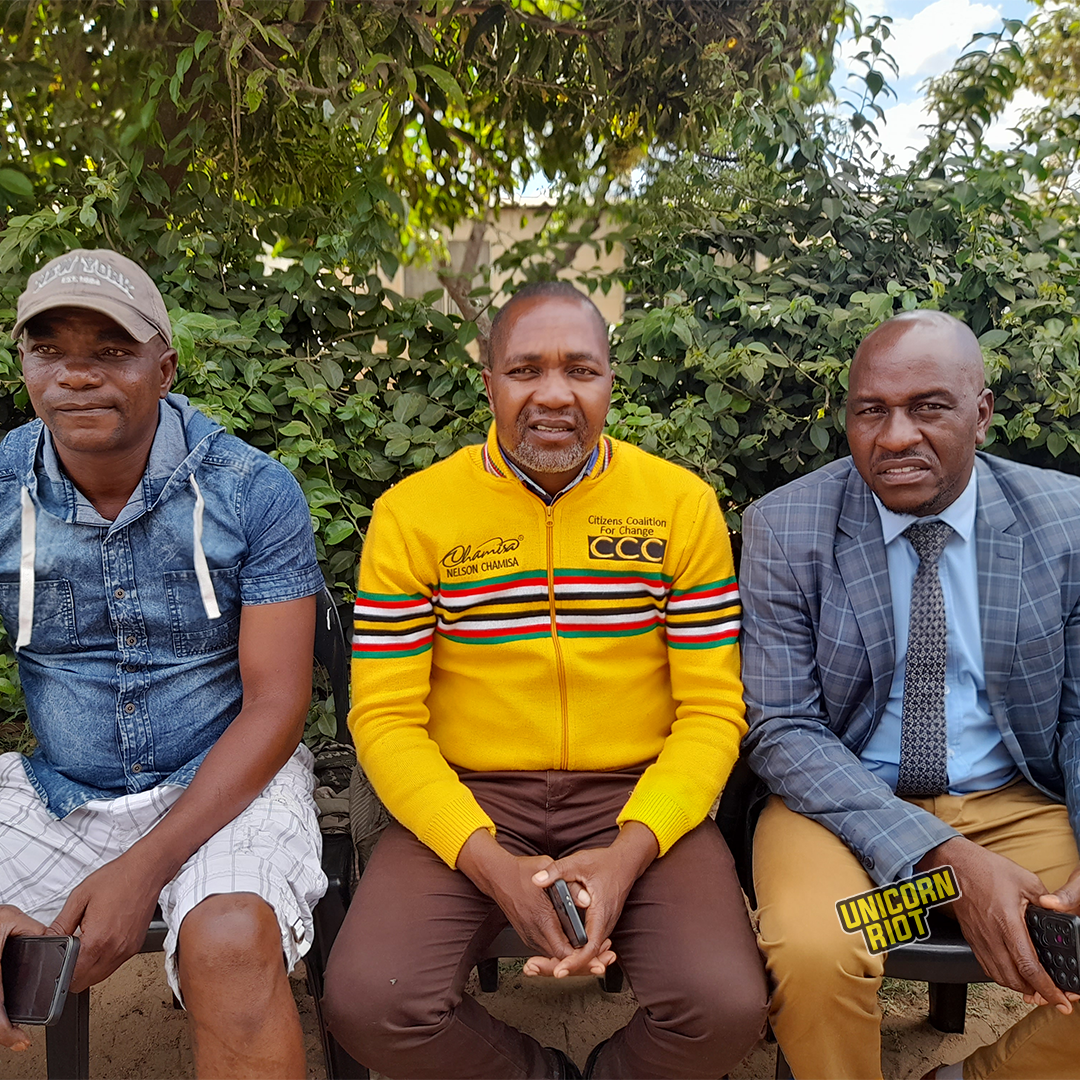
Kufahakutizwi was previously recalled during his council tenure in 2020. Nelson Chamisa’s previous party was incapacitated by recalls then leading to the formation of CCC, which Kufahakutizwi was re-elected under in 2022. Municipal wards and parliamentary constituencies with recalled representatives had stayed up to three years without representatives as elections were suspended during the COVID-19 lockdown.
On the day of the suspended poll, Kamunhu Shopping Centre in Mabvuku was a haven of diversions, scores huddled before an outdoor TV screen at a soccer-betting facility, and still more pushing wares or sharing a drink. CCC supporters were unbelieving. Dressed to match his soccer analogy in Manchester United’s away kit, an activist named “Walker,” said it was unthinkable for a match to be won before kick-off. “I am here to defend my vote. I cannot be swindled by Zanu-PF while I look on,” Walker told Unicorn Riot.
“I was up all night waiting to cast my vote at Tafara 5 High School,” he said in reference to an August 23 irregularity whereby general elections went into the night and extended into an unprecedented second day by presidential decree. CCC blamed the electoral commission for working with the ruling party to suppress the voter population in opposition strongholds by not availing ballots on time. “I was ready to spend the night in the queue again today.”
“The outcome of a match is never the referees’ call,” Walker said, likening High Court judges to match officials. “Even if you are a special striker, you cannot be awarded a goal while the ball is still at the center. I need people who are as brave as I am. We need to march for the by-election to go ahead,” said the activist who was a victim of state-sponsored violence during Robert Mugabe’s 2008 run-off campaign.
Kufahakutizwi was just as defiant. “Here in Mabvuku, we beat Mr. Scott end to end like an apostolic drum and the by-elections were going to be his second reckoning. That’s why the courts have refused me my right to contest,” the former MP said. “Basically, I believe in Zimbabwe there is no rule of law. Everything is being commandeered, from the judiciary to the police service, everywhere, so I think the best way out is to liberate ourselves out of this system.”
A CCC supporter who identified herself as Mrs. Chirwa said on the suspended voting day that the anointing of Sakupwanya was the work of dirty money. “Munyaradzi (Kufahakutizwi) has no money to buy an election. He has the power of commissioning citizens. Scott has been voted by the High Court. The High Court has proven that its opinions and powers exceed those of 15 thousand people who voted Munyaradzi Kufahakutizwi in August which is a shame.”
“It [pains] us as the people of Mabvuku. Anyway, we know that they will see the power of the people. All Scott is good at is drilling boreholes. We don’t want boreholes and food donations. We want tapped water; that’s proper service delivery. We want jobs and medicines in hospitals,” said Mrs Chirwa.
Reformer or Impostor?
The author of Kufakakutizwi’ misfortunes and CCC’s existential bind is a previously little-known politician named Senge Tshabangu went on to recall 17 councilors on October 18, 52 councilors on November 10, and 13 MPs and five senators on November 14. The total number of recalled CCC officials is now 108 and Tshabangu has successfully petitioned the courts to stop 46 of them from participating in by-elections.
The self-proclaimed secretary general professes high-minded opposition to former CCC president Nelson Chamisa’s leadership style and claims to have the party’s interests. But he opened himself up to skepticism when his court action effectively donated a CCC seat to ZANU-PF’s Sakupwanya on December 7 and subsequently gifted ZANU PF five uncontested council seats on January 19, ahead of February 3 by-elections.
Tshabangu regionally framed the motive of his first recalls, arguing then CCC president Nelson Chamisa had imposed his own candidates in Ndebele-speaking regions.
Kufahakutizwi was, however, the only MP from Shona-speaking Harare. Tshabangu rationalized things by saying he had recalled Kufahakutizwi by mistake. To make good on the claim, he did not nominate an extra candidate in Mabvuku-Tafara by-elections and even said he had signed Kufahakutizwi’s nomination papers, a claim the latter disputed. Tshabangu’s last-minute about-turn, adding Kufahakutizwi to his court petition barring recalled candidates, made way for Sakupwanya to be anointed without contest.
Chilling Effect
In the run-up to the by-elections, two CCC supporters, Tapfumanei Masaya and Jeff Kalosi, were abducted while campaigning for Kufahakutizwi in Mabvuku.
Kalosi was tortured and dumped at a nearby farm. Masaya, a pastor who reportedly led prayers before door-to-door itineraries and other party programs, was found dead on November 13.
Between general elections and the murder of Tapfumanei Masaya, a CCC MP, a CCC councilor and the party’s former MP for Mabvuku-Tafara James Chidhakwa had been abducted and tortured. The opposition blamed ZANU PF which, in turn, called the abductions stage-managed despite the evidence of injuries and, tragically, Masaya’s death.
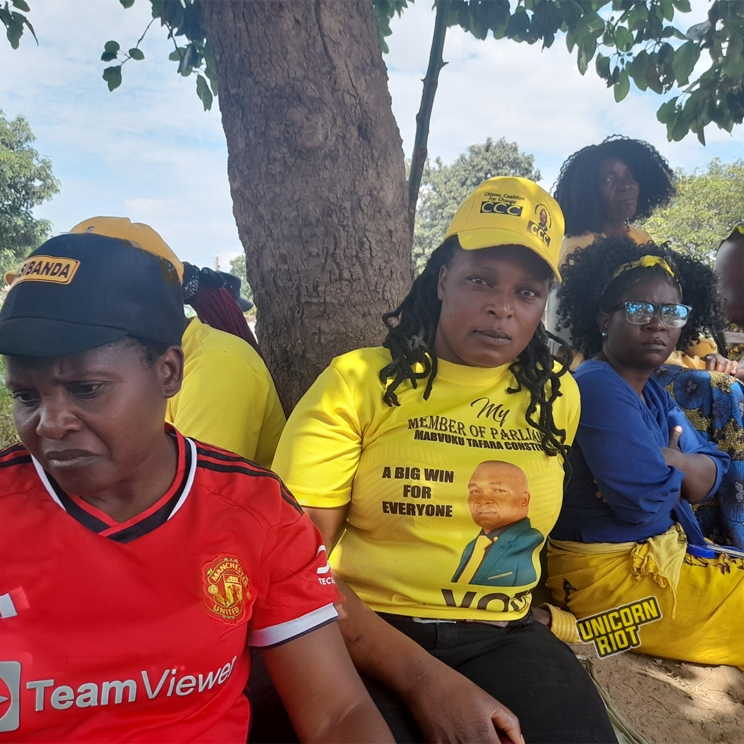
“Some people are heartless. You kill someone like a chicken. I don’t think he lasted hours in their hands before they murdered him. In five hours, they must have been done with him. His whole body was cut by baton sticks and machetes. It’s hard to understand what kind of country kills citizens for political positions,” Kufahakutizwi said at Masaya’s funeral.
“A life was lost because Tshabangu wanted blood to flow before donating our seat to Scott,” Mrs. Chirwa said. “It was better for him to just say I have barred Munyaradzi from standing for re-election; there is no longer a candidate. We would still be with Pastor Masaya today.”
Mrs. Chirwa’s own son, Joseph, was hit in the head with a brick and had to be stitched while campaigning for Kufahakutizwi. “As we were campaigning for the by-elections we were not free,” she said. “Our activists had to hide their regalia in their bags and couldn’t move alone for fear of being followed. ZANU-PF was saying ‘we will finish you’ and ‘we will beat you.’”
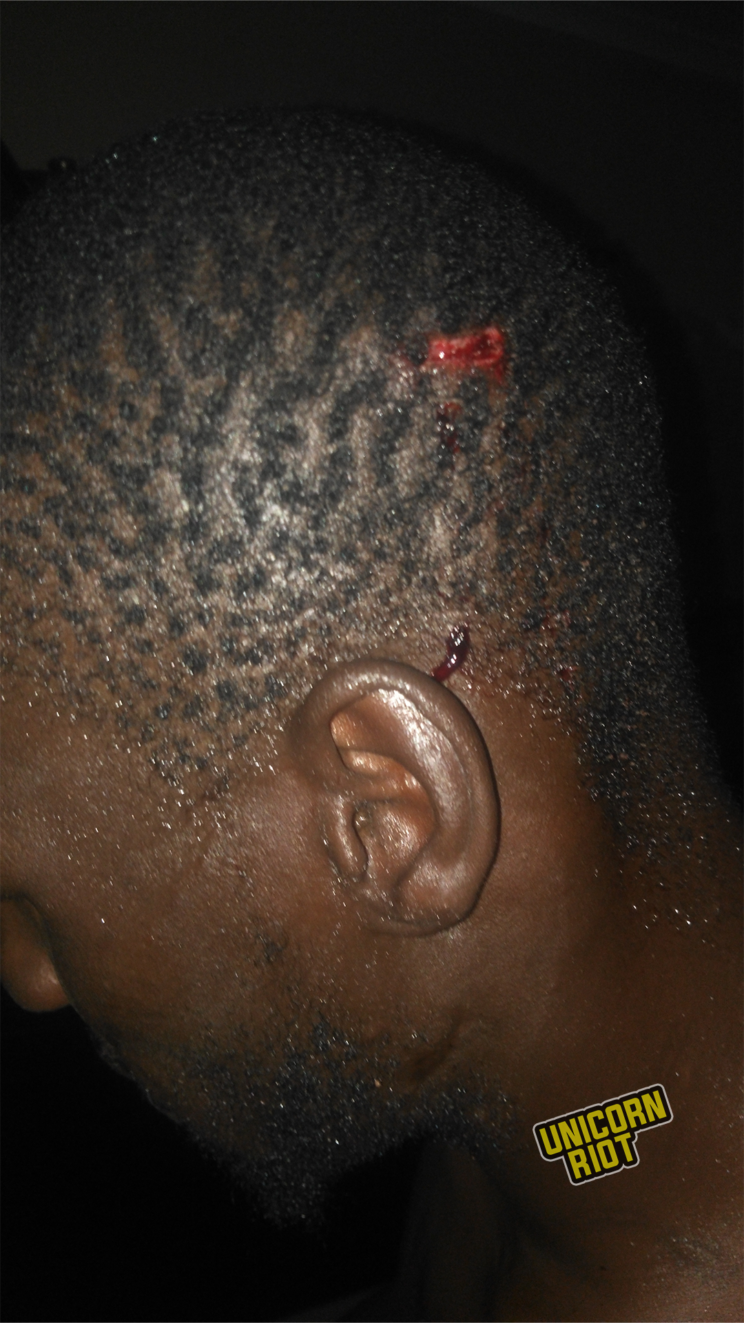
Tonderayi Dombo, a former University of Zimbabwe SRC president resident in Mabvuku said, “Our heart bleeds because even if you are to look around the area where we are, the landscape tells you that this is a poverty-stricken environment. There is no electricity; there is no running tap water, behind us is a [bush pump] borehole.”
“And to think that maybe when they see that we are using boreholes, they want to turn this into another rural area where they can practice violence with impunity, that saddens us. As the people of Mabvuku, we wish that this illegitimate government would stop abusing us,” Dombo said at the pastor’s funeral.
Some Kind of Justice
Two months later, Masaya’s death over a political farce has not been accounted for by the police. A number of CCC activists called for Sakupwanya to be investigated for the murder as his campaign vehicle was allegedly used in the abduction of Kalosi and Masaya. Other residents say the ZANU-PF candidate’s campaign vehicles used to park on police premises, complicating hopes for an objective investigation.
Kufahakutizwi said Masaya’s clothes were found in a trunk that had a police number inscribed in it. “So now we are asking ZRP (Zimbabwe Republic Police) to make proper investigations to see whether these people are connected with the police or if they are gold panners who were hired from places like Kwekwe because I know that my rival candidate is involved with gold panners.”
However, it is Kufahakutizwi who has found himself in the hands of police. In a state case dated 28 November, the former MP is accused of assaulting a Masaya neighbor who was reportedly in ZANU l-PF regalia for throwing stones at the funeral.
In a state case dated November 23, Kufahakutizwi is accused of destroying side windscreensbelonging to a vehicle of a “Pastor4ED,” — a ZANU PF-affiliated clerical organization, member. Out on bail, Kufahakutizwi has, at least, escaped the fate of his party colleague, Job Sikhala, recently released after more than 500 days in pre-trial detention.
Supermajority Regained
ZANU-PF won all the six seats in the February 3 by-elections and has now secured a two-thirds majority in parliament. The opposition’s next campaign will be dramatically weakened as ZANU-PF is unlikely to use its new supermajority to “reform itself out of power.”
First in the works might be a new law to ban MPs who resign from standing for election again. A few CCC MPs have resigned from the party in solidarity with Nelson Chamisa, who also left the party alleging that it has been “infiltrated” and “contaminated.” The presumptive bill, hinted by the ZANU-PF chief whip last week, would contain remaining opposition MPs to the “captured” CCC instead of following their former president to a new party.
Meanwhile, Mr. Gold’s fortunes are piling in parliament. “Honorable P. Sakupwanya will serve on the Committees on Mining and Mining Development, and Local Government, Public Works and National Housing,” the Speaker of Parliament announced on January 31. In this new capacity, Sakupwanya will influence policy for a sector in which he is a controversial actor. For his part, the author of the recalls, Sengezo Tshabangu, has rewarded himself with a senate seat in one of the vacancies he created.
Onai Mushava is an independent Zimbabwean journalist and writer who regularly covers African politics, arts and culture. Read his latest on Kendrick Lamar’s Africa tour and read his previous articles on Zimbabwe’s ongoing electoral crises below:
Zimbabwean Opposition ‘Disengages’ From Parliament in Protest of ‘Illegal Recalls’ – October 26, 2023
Zimbabwean Government Mounts Post-Election Propaganda Campaign – October 12, 2023
Follow us on X (aka Twitter), Facebook, YouTube, Vimeo, Instagram, Mastodon, Threads, BlueSky and Patreon.
Please consider a tax-deductible donation to help sustain our horizontally-organized, non-profit media organization:

